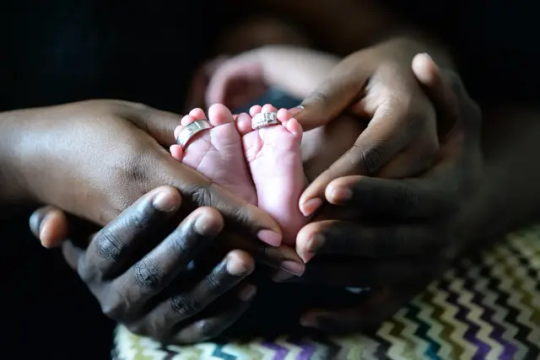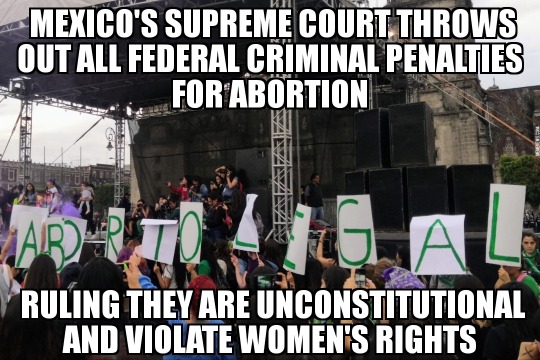#pregnancy in america
Explore tagged Tumblr posts
Text
The US infant mortality rate rose last year. The CDC says it’s the largest increase in two decades

NEW YORK (AP) — The U.S. infant mortality rate rose 3% last year — the largest increase in two decades, according to the Centers for Disease Control and Prevention.
White and Native American infants, infant boys and babies born at 37 weeks or earlier had significant death rate increases. The CDC’s report, published Wednesday, also noted larger increases for two of the leading causes of infant deaths — maternal complications and bacterial meningitis.
“It’s definitely concerning, given that it’s going in the opposite direction from what it has been,” said Marie Thoma, a University of Maryland researcher who studies maternal and infant mortality.
Dr. Eric Eichenwald, a Philadelphia-based neonatologist, called the new data “disturbing,” but said experts at this point can only speculate as to why a statistic that generally has been falling for decades rose sharply in 2022.
RSV and flu infections rebounded last fall after two years of pandemic precautions, filling pediatric emergency rooms across the country. “That could potentially account for some of it,” said Eichenwald, who chairs an American Academy of Pediatrics committee that writes guidelines for medical care of newborns.
Infant mortality is the measure of how many babies die before they reach their first birthday. Because the number of babies born in the U.S. varies from year to year, researchers instead calculate rates to better compare infant mortality over time. The U.S. infant mortality rate has been worse than other high-income countries, which experts have attributed to poverty, inadequate prenatal care and other possibilities. But even so, the U.S. rate generally gradually improved because of medical advances and public health efforts.
The national rate rose to 5.6 infant deaths per 1,000 live births in 2022, up from from 5.44 per 1,000 the year before, the new report said.
The increase may seem small, but it’s the first statistically significant jump in the rate since the increase between 2001 and 2002, said Danielle Ely, the CDC report’s lead author. She also said researchers could not establish whether the 2022 rise was a one-year statistical blip — or the beginning of a more lasting trend.
Overall in the U.S., the death rate fell 5% in 2022 — a general decrease that’s been attributed to the waning impact of the COVID-19 pandemic, especially on people 65 and older. U.S. maternal deaths also fell last year.
More than 30 states saw at least slight rises in infant mortality rates in 2022, but four states had statistically significant increases — Georgia, Iowa, Missouri and Texas.
In numbers, U.S. infant deaths surpassed 20,500 in 2022 — 610 more than the year before nationwide. But Georgia had 116 more infant deaths than the year before, and Texas had 251 more.
“It would appear that some of the states could be having a larger impact on the (national) rate,” Ely said, adding that smaller increases elsewhere also have an effect — and that it’s hard to parse out exactly what places, policies or other factors are behind the national statistic.
#The US infant mortality rate rose last year. The CDC says it’s the largest increase in two decades#infant mortality#pregnancy in america#mothers#birthing#Womens Health
3 notes
·
View notes
Text
You don't have to be the person who feels like they can't help the situation in Gaza because they're thousands of miles away. There is plenty you can do!! SAVE THE ZAQOUTS!!!
#save the zaqouts#free palestine#gaza#palestine#free gaza#from the river to the sea palestine will be free#pray for palestine#pregnancy#rafah border#genocide#israel#israel is committing genocide#ceasefire#america#usa#permanent ceasefire#current events
1K notes
·
View notes
Text
anyway found this on tiktok so it’d be great if you could spread it around even if you don’t need it!! for women and trans men and anybody - especially those living in america - who can get pregnant

#donald trump#kamala harris#politics#planned parenthood#signal boost#basic human rights#pro choice#trans men#trans man#transgender#healthcare#health care#pregnant#pregnancy#my body my choice#my body my rules#usa#american#america#liberals#leftist
124 notes
·
View notes
Text

Cw: Mpreg/Male Pregnancy
Recently somebody requested a drawing of Captain America
I had way to much fun working on this, but anyways....lol Here's the finished drawing :3
176 notes
·
View notes
Text
Before we hit 4th of July...
Listen. I know our country is in shambles. Our culture has been torn apart. Our government is the enemy of the people. Our institutions are captured by ideologues. Our media and government have been lying to us since before any of us were born. The Constitution has been ripped to shreds. We have long since passed the point where others would have begun throwing tea in the harbor.
I am not proud of where our country is now. We are in decline. I fear for where we are headed.
Independence Day is not a celebration of our government or our leaders. It's also not a celebration of what our country is today. It's not even really a celebration of some long-gone glory days.
Independence Day is two things:
A reminder of what our country was intended to be, that we should not be complacent or satisfied with things as they are now.
A chance to be obnoxious and annoy non-Americans
So starting at about 11pm tonight I will continue my tradition of having scheduled posts publish every hour for the duration of Independence Day.
I don't want to hear all the edgy takes about how terrible our country is. I know. I'm aware. You're not being original. Being disillusioned doesn't make you cool. Just let me have this one day - and maybe let yourself have a little fun with being American.
#Also yes I will re-pin my pregnancy resource master post after Independence Day#4th of July#Independence Day#America
497 notes
·
View notes
Text
𝐃𝐨 𝐲𝐨𝐮 𝐥𝐨𝐯𝐞 𝐦𝐞?
Summary: You find out Steve has been cheating with other girls on his guy's night out. But you also just found out you are pregnant...
Characters: Steve Rogers, Fem!Reader, Bucky Barnes, Natasha Romanoff
Warnings: Cheater Steve, hurt, angst, mention of abortion, mention of infertility
Badly written and mistakes were def made but I hope u like it!

I looked over the picture again. Steve kissing some random blonde girl in the bar. The phone was clutched in the palm of my hand. It was not the right time to find this out.
I glanced at your other hand, a pregnancy test that read 'POSITIVE' in big letters. Tonight was going to be the night I told him. The test was from the day before, Steve was on assignment so it didn't feel right to throw the news at him right after a long mission.
No one else knew either, of course, they'd be happy but it felt wrong to share it with my friends before my boyfriend knew.
The elevator dinged, letting it be known someone was there. I quickly put the test away in my pocket and wiped the stray tears from my face.
"Y/n? you are up?" Natasha asked as she walked into the living room area. The rest of the boys were following behind her, all drunk or slightly drunk of course.
"I was waiting for Steve to come home," I give a half-hearted smile to her. She nods and sits next to meme.
Steve stumbles to the couch across from me and falls back onto it. "So how was boy's night out?" my phone is set face down on my thigh. Everyone looks a bit tense as they realize I saw the photo they sent.
"Good, had fun doing stuff," Steve sighs. I nod along and pick my phone up, turning it on and pressing the photo.
"I bet you had so much fun kissing that blonde huh?" I turn the phone towards him. His eyes widen at the sight of the photo. He immediately sits up.
"I can explain!" his voice was filled with panic. Like I had just uncovered something he'd been keeping from me forever. Tears starting to sting my eyes. I tried to keep them back but the hormones mixed with finding all this out got the better of me.
"Explain what? That you cheated on me? That all the trust I put into you was a lie? That this relationship meant nothing to you?" I ask him, the tears falling down my face. I wipe them away but they just continue.
Steve shakes his head and gets up. I stand up and try to walk away but he puts his hands on my shoulders and stops me from walking any further. "Please baby, please let me explain," he begs. It almost makes me rethink it all, just for a split second.
"Explain then."
"I was drunk, I had no idea what I was doing." He takes his hands off my shoulders and rubs his head.
"Drunk? that's your excuse? Steve that photo was taken right after you guys arrived at the bar. You probably only had two drinks in you," I yell. Everyone around us is shocked. I'm never one to yell, even when provoked.
I was angry, sad, hurt. I was feeling everything and I couldn't keep it in anymore. "Listen, I'll never do it again. Honey, please." Steve looks into my teary eyes and my heart finally breaks.
He's not the Steve I loved. He's not the one I trusted and shared my secrets with. "You know, I really loved you. It may have been just another relationship to you, but I wanted to marry you." I wipe my tears again and this time they don't return.
"We can still do that baby! You and me," He says, holding my hands in his.
"Tell me one thing, if you tell the truth I'll forgive you." He nods and looks at me expectantly. "Did you love me? Like actual love," I ask. He hesitates before speaking up.
"Yes. Of course, I loved you." I can tell he's lying. I always knew when he was lying and this hurt me even worse. I knew what the answer was but hearing it from him just hurt me in ways I could never explain in any words.
I pull away from him and reach into my pocket. I pull the pregnancy test out and hold it up.
"I was going to tell you tonight, I found out yesterday." Steve beams when it registers that I'm holding a pregnancy test.
"We are going to have a baby?" He asks excitedly.
"No, you have nothing. The moment you decided to cheat on me you lost the right to me and this baby," I start. "I struggled with fertility, I told you this. I confided in you about how I was ready to start a family because I trusted and loved you completely. When the doctor told me I might never be able to have a baby I confided in you. I cried on your shoulder and you promised we would get through it. I was so stupid to actually believe I'd finally get what I wanted."
Steve's smile drops and he looks confused. "What do you mean? Are you going to have an abortion?"
"I haven't made up my mind yet. All I do know is that I want nothing to do with you ever. We are done, consider me dead from now on." I throw the pregnancy test at him and walk to our shared room.
I hear footsteps following behind me. "Y/n?" A voice says. I turn to see Natasha looking at me with a concerned face. I finally let the tears go that I was holding in. She rushes to me and holds me close to her chest as we sit on the bed.
"I loved him, Nat, I loved him," I sob out. Natasha pets my hair and rocks us back and forth.
"I know hun, I know."

#captain america#bucky barnes#steve rogers#natasha romanoff#cheater steve rogers#hurt/comfort#angst#pregnancy#steve rodgers x reader#fanfic#fem reader#fanfiction#cheating#little use of y/n#viixenvi
177 notes
·
View notes
Text

IM GONNA SHIT WHAAAATTT
#hetalia#aph hetalia#ヘタリア#hetalia fanart#aph italy#hws italy#aph japan#hws japan#aph germany#hws germany#aph america#hws america#aph england#hws england#im a alpha gamer i dont use the assigned names#HES PULLING THE PREGNANCY CARD THIS EARLY????#peep the ifunny.co#guys im soryr to anyone who follows me that severely dislikes hetalia#haha#world history class did this to me#went from ironically to unironically brah#???????#this actually took really long#please slam a like#thank you chat#cross posted on twitter#cross posted on deviantart
76 notes
·
View notes
Text
Last night I was lying in bed and realized I forgot to buy a pregnancy test at the grocery store. I got up and rifled around the bathroom because I could've sworn I had a spare. I just wanted to give myself the extra peace of mind immediately before my annual GYN appointment since they always do one. I have NO reason to think I'm pregnant. The chance would be miniscule, but I literally lost sleep over the idea of having a positive test recorded in my chart, and then of course just thinking about the state of our rights. I'm in the privileged position of having education, access to contraceptives, etc. and it's SO much worse for others.
#trump's america#pro choice#cw anxiety#cw pregnancy#abortion rights#election anxiety#fuck trump#reproductive rights
26 notes
·
View notes
Video
tumblr
Care about healthcare? You should care about whats happening in Idaho
#video#tiktok#tiktoks#story time#wtf#usa#united states#united states of america#politics#hospital#hospitals#idaho#abortion#pregnancy#pregnant#doctor#doctors#jesscraven101
499 notes
·
View notes
Text

Thor: Oh by Asgard, this sauce is even too hot for my divine, royal throat!
Steve: Yeah, I gave up a long time ago. I can‘t feel my tongue anymore.
Tony: Me neither. I think I‘ll throw up next!
Natasha: What are you waiting for, you bunch of wimps? Bring on the next round of chicken wings. And finally put some hot sauce on them that I can feel on my tongue!
James: No one beats mom in a hot sauce eating competition when she‘s got a pregnancy craving!
#romanogers#black widow#captain america#natasha romanoff#steve rogers#pregnancy cravings#hot sauce#chicken wings#thor odinson#tony stark#iron man#james rogers#domestic avengers#the avengers#my otp
24 notes
·
View notes
Text
"what if you were aborted" I WAS aborted! My mom had an abortion at 17 and then 3 years later I was born on the exact same day she had an abortion on. Told her I came back to haunt her lmao
#like this is only partly a joke this did actually happen#i only found out like a few years ago haha..#anyway. even lithuania at a barely post soviet time had safe abortions. (sadly no birth control back then hence the unwanted pregnancy)#day three im still in genuine shock how backwards america is going...
18 notes
·
View notes
Text

#free palestine#palestine#gaza#free gaza#from the river to the sea palestine will be free#pray for palestine#premature babies#pregnancy#genocide#child murder#war on children#israel#israel is committing genocide#ceasefire#permanent ceasefire#america#usa
54 notes
·
View notes
Text
Eric Hananoki at MMFA:
Since the Supreme Court overturned Roe v. Wade in 2022, news outlets have published numerous stories documenting how restricted abortion access has medically harmed women across the U.S. In contrast, numerous groups involved with Project 2025, including lead organizer The Heritage Foundation, have falsely claimed over the years that abortions are never medically necessary. The Associated Press reported that doctors have said “that there are many circumstances in which abortion — meaning the termination of a pregnancy — can be medically necessary,” and AFP wrote that “the scientific consensus” is “that abortion is sometimes medically necessary.”
Since Dobbs, media outlets have also highlighted cases where state abortion bans have caused significant medical issues. ABC News talked to “18 women from across 10 states who say their medical care was impacted by abortion bans -- bringing some of them to the brink of death.” ProPublica reported on how doctors “say they can’t give women potentially lifesaving care.” The Washington Post “found that many hospitals have failed to provide specific guidance or policies to help doctors navigate high-stakes decisions over how to interpret new abortion bans — leading to situations where patients are denied care until they are on the brink of permanent injury or death.” And the AP reported this week on how “abortion bans complicate risky pregnancy care.” Media Matters has documented how Project 2025 seeks to significantly restrict reproductive rights in the country. Multiple Project 2025 partners have also continued to signal that they want to criminalize abortion.
Many groups that are in partnership with Project 2025, such as Susan B. Anthony Pro-Life America, Family Research Council, American Family Association, and lead sponsor Heritage Foundation, have all pushed anti-abortion misinformation falsely claiming that abortions are never medically necessary.
#Abortion#Pregnancy#Anti Abortion Extremism#Abortion Bans#Project 2025#American Family Association#The Heritage Foundation#Dobbs v. Jackson Women's Health Organization#Family Research Council#Eagle Forum#The Heartland Institute#Susan B. Anthony Pro Life America#Students For Life Of America#Young America's Foundation#Media Research Center#Ethics and Public Policy Center#California Family Council#AAPLOG
28 notes
·
View notes
Text
Women should really consider not having children right now. Up to 20% of pregnancies end in miscarriage, and that could be a death sentence in trump’s america.
Even if you’re in a “safe” state now, you may not be in the near future.
This leads me to another dark topic that must be thought about. Even if you’re not sexually active, get on birth control. Sexual assault rates are astronomical and they result in pregnancies, too.
You have to protect yourself.
#america#us politics#pregnancy#abortion#abortion rights#birth control#womens issues#womens rights#fuck the patriarchy#fuck trump#fuck the gop
8 notes
·
View notes
Text
Pregnancy deaths rose by 56% in Texas after 2021 abortion ban, analysis finds
https://www.nbcnews.com/health/womens-health/texas-abortion-ban-deaths-pregnant-women-sb8-analysis-rcna171631
#pregnancy#deaths#texas news#texas#abortion bans#abortion#human rights#pro abortion#abortion is healthcare#abortion is a human right#abortion is a right#abortion is essential#abortions#usa is a terrorist state#usa is funding genocide#usa news#usa politics#usa#american indian#american#america#ausgov#politas#auspol#tasgov#taspol#australia#fuck neoliberals#neoliberal capitalism#anthony albanese
8 notes
·
View notes
